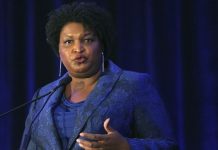Share This Article on Social Media 😐
In conjunction with the global uprising against white supremacy and the ongoing murder of Black people by police, academics and educators are mobilizing to bring awareness to deep educational disparities around science and math education for Black students and other students of color — a dynamic that perpetuates structural inequalities along racial lines.
Science, technology, engineering and math (STEM) university departments remain disproportionately white, and that dynamic carries over into STEM-related careers in both public and private sectors. The lack of representation at school and work can be a heavy weight to bear, says Dr. Lataisia Jones, the first African American to earn a Ph.D. in biomedical sciences from Florida State University (FSU), who is now an ethics fellow at the American Society for Microbiology.
Jones began her graduate studies at FSU two months after 17-year-old Trayvon Martin was killed by George Zimmerman in Sanford, Florida, and three months before 17-year-old Jordan Davis was killed by Michael Dunn in Jacksonville, Florida. Jones says being the only Black person in her department and having no one in arm’s reach to talk with about what had just happened was a very traumatic transition into her graduate studies. “At first I thought I needed to keep it to myself and just get through the program.”
While she soon found mentors in fellow Black academics like Dr. Adrienne Stephenson and Dr. Regina Knight-Mason, the shadow of racial discrimination in the halls of science followed Jones through her degree and postdoc. Once, while working in her lab, Jones was mistaken for the janitorial staff. Another time, she recalls having to put up with an Asian American colleague screaming at her over a misunderstanding about sharing a centrifuge.
Racial Disparities in Science and Math
Ongoing demeaning experiences is what makes being Black in STEM fields “exhausting,” says Dr. Aisha Lawrey, senior director of programs and scholarships at the National Action Council for Minorities in Engineering. On the ride up to a lecture she once gave on the importance of diversity in curriculum design, an elevator full of older white male colleagues complained about how the event they were about to attend — the talk she was giving — was going to be a waste of time. She remained silent on the elevator and proceeded to the front of the lecture hall, where she watched the men’s jaws drop. “They didn’t even consider the fact that I would be teaching,” she says, explaining how she shared what had just happened in real time as part of her presentation. “I’m not the person bringing your coffee, I’m actually the instructor,” she told the crowd.![]()
SOURCE ⇒ THRUTHOUT
Consider supporting AMIBC™. Contribute by clicking on the advertisers and sponsors featured on AMIBC™ and please utilize them. Readers from around the world, like you, make our work possible. We need your support to deliver quality, vetted, investigative journalism – and to keep it open for everyone. At a time when factual, honest reporting is critical, your support is essential in protecting our editorial independence. The narratives and issues impacting all Americans is tantamount to the AMIBC™ platform. Every contribution, however big or small, is valuable for our future. Make sure to join the AMIBC Founders Club to maximize the total advantage of being a subscriber.


































